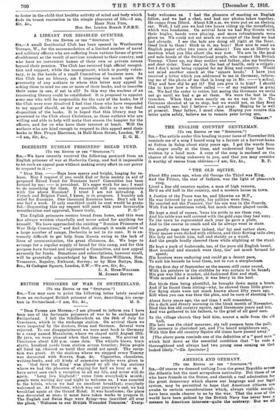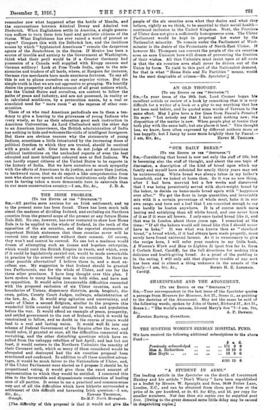AMERICA AND GERMANY.
[To THE EDITOR OF THE " SPECTATOR.") Sus,—Of course we demand nothing from the great Republic across the Atlantic but the most scrupulous neutrality. But those of us who have friends in the States, and cherish a real admiration for the great democracy which shares our language and our legal system, may be permitted to hope that American citizens are awake to certain considerations which, always visible enough, have been made clearer to us- by the war. That the seas of the world have been policed by the British Navy has never been a menace to American interests—quite the contrary. But we sll remember now what happened after the battle of Manila, and the conversations between Admiral Dewey and Admiral von Diederiah. When Englishmen settle in America, a single genera- tion suffices to turn them into loyal and patriotic citizens of the States. What Englishman has ever raised a word of protest or regret? Compare this with the Delbriick law, and the insidious means by which " hyphenated Americans " remain the dangerous agents of the Deutschtum in the States. If Mexico has been a source of trouble and anxiety to the Government at Washington, think what their peril would be if a Greater Germany had possession of a Canada well supplied with Krupp cannon and German soldiery! Look at Free Trade India, open to the mis- sionaries and traders of all lands, where, at Rangoon for instance, German rice merchants have made enormous fortunes. To say all this Is not to plume ourselves on our superior virtue. But the simple truth is that we are not aggressive or grasping. We heartily desire the prosperity and advancement of all great nations which, like the United States and ourselves, are content to follow the paths of peace and industry, and are not possessed, in reality or in calculated semblance, by a persecution mania, by a real or simulated need for " more room " at the expense of other com- munities.
Those of us who read American periodicals see in them a ten- dency to give a hearing to the grievances of young Indians who (very wisely, so far as their education goes) seek instruction in American Universities. As Lord Chelmsford said the other day to an American interviewer, the British administration of India has nothing to hide and welcomes the visits of intelligent foreigners. But there are obvious reasons why the statements of young Indians, sometimes a little intoxicated by the increasing doses of political freedom to which they are treated, should be received with a grain of salt. Over here we do not judge of American political institutions on the unchecked reports of even the best educated and most intelligent coloured men or Red Indians. We can hardly expect citizens of the United States to be experts in the history of India. But we have ourselves so much sympathy with the efforts of Americans to do justice, and more than justice, to backward races, that we do expect a like comprehension from men who share our speech and whose institutions only differ from ours in having taken a more democratic turn in externals than in our more conservative country.—I am, Sir, &c., J. D. A.













































 Previous page
Previous page